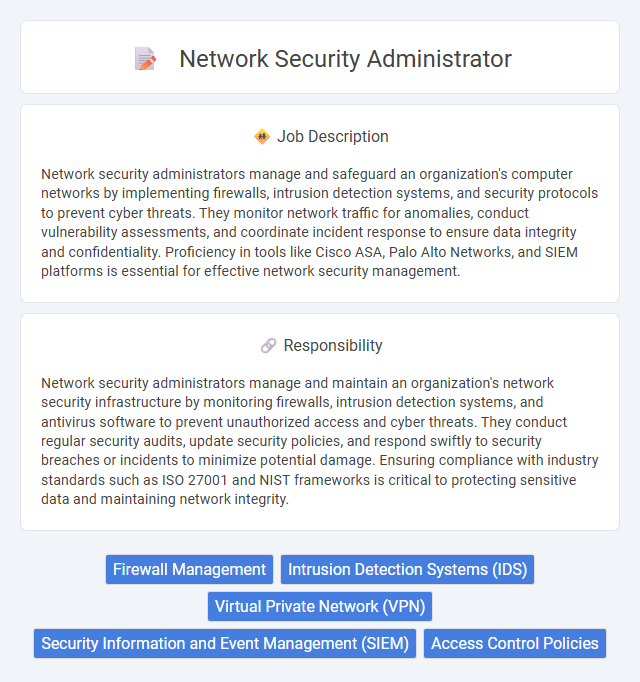
Network security administrators manage and safeguard an organization's computer networks by implementing firewalls, intrusion detection systems, and security protocols to prevent cyber threats. They monitor network traffic for anomalies, conduct vulnerability assessments, and coordinate incident response to ensure data integrity and confidentiality. Proficiency in tools like Cisco ASA, Palo Alto Networks, and SIEM platforms is essential for effective network security management.
Individuals with a strong attention to detail and an interest in technology will likely be well-suited for a Network Security Administrator role. Those who can work well under pressure and enjoy problem-solving may find this job aligns with their strengths. People who prefer predictable routines might find the dynamic challenges of network security less suitable for their preferences.
Qualification
A network security administrator must possess strong knowledge of firewall management, intrusion detection systems, and vulnerability assessment tools. Proficiency in operating systems such as Windows, Linux, and networking protocols like TCP/IP is essential for maintaining secure network environments. Certifications including CISSP, CompTIA Security+, and CEH significantly enhance qualifications and demonstrate expertise in protecting network infrastructure.
Responsibility
Network security administrators manage and maintain an organization's network security infrastructure by monitoring firewalls, intrusion detection systems, and antivirus software to prevent unauthorized access and cyber threats. They conduct regular security audits, update security policies, and respond swiftly to security breaches or incidents to minimize potential damage. Ensuring compliance with industry standards such as ISO 27001 and NIST frameworks is critical to protecting sensitive data and maintaining network integrity.
Benefit
Network security administrators likely benefit from enhanced job stability due to the increasing demand for cybersecurity professionals. They probably gain opportunities for continuous learning and skill development as cyber threats evolve rapidly. Higher earning potential and career advancement prospects may also be common advantages within this role.
Challenge
Network security administrators likely face constant challenges in adapting to rapidly evolving cyber threats and vulnerabilities. The role probably demands continuous learning to implement advanced security protocols and monitor complex network infrastructures effectively. Managing unexpected breaches or attacks may require quick decision-making under pressure, highlighting the dynamic and demanding nature of this position.
Career Advancement
A Network Security Administrator plays a crucial role in protecting an organization's IT infrastructure by implementing firewalls, monitoring network traffic, and responding to security breaches. Career advancement opportunities often lead to positions such as Network Security Engineer, Cybersecurity Analyst, or Chief Information Security Officer (CISO), with increased responsibilities in strategy and risk management. Earning certifications like CISSP, CEH, or CompTIA Security+ significantly enhances job prospects and potential for leadership roles.
Key Terms
Firewall Management
Network security administrators specialize in firewall management to protect organizational data from cyber threats by configuring and monitoring firewall systems such as Cisco ASA, Palo Alto, and Fortinet. They implement access controls, conduct regular rule audits, and respond promptly to security incidents to prevent unauthorized network access. Proficiency in intrusion detection systems (IDS) and firewall policy optimization ensures continuous network integrity and compliance with cybersecurity standards.
Intrusion Detection Systems (IDS)
Network security administrators specializing in Intrusion Detection Systems (IDS) play a critical role in monitoring and analyzing network traffic to identify and mitigate potential cyber threats. They configure, maintain, and fine-tune IDS platforms like Snort, Suricata, or Cisco IDS to detect unauthorized access, malware, and anomalous activities in real-time. Expertise in log analysis, threat intelligence integration, and incident response ensures rapid identification and containment of security breaches, safeguarding organizational assets.
Virtual Private Network (VPN)
Network security administrators manage Virtual Private Network (VPN) infrastructure to ensure secure remote access and data encryption across organizational networks. They configure VPN protocols such as IPsec, SSL, and OpenVPN to protect sensitive information from cyber threats and unauthorized access. Continuous monitoring and updating of VPN security policies strengthen defenses against evolving vulnerabilities and maintain compliance with industry standards.
Security Information and Event Management (SIEM)
Network security administrators specialize in managing Security Information and Event Management (SIEM) systems to monitor, detect, and respond to cybersecurity threats in real time. They utilize SIEM tools like Splunk, IBM QRadar, or ArcSight to aggregate and analyze log data, ensuring rapid identification of security incidents and compliance with regulatory standards. Their expertise in configuring SIEM alerts and conducting forensic analysis is critical for maintaining organizational cybersecurity posture and minimizing breach impacts.
Access Control Policies
Network security administrators design and enforce access control policies to safeguard organizational data and systems from unauthorized access. They implement role-based access control (RBAC), multi-factor authentication (MFA), and least privilege principles to ensure users have appropriate permissions aligned with their job functions. Regular audits and updates to access control lists (ACLs) help mitigate security risks and comply with industry regulations such as GDPR and HIPAA.
 kuljobs.com
kuljobs.com